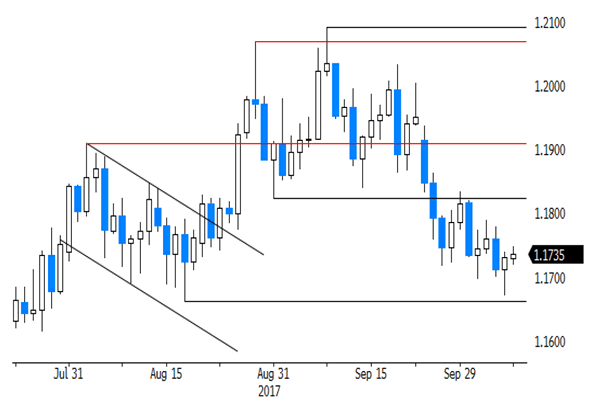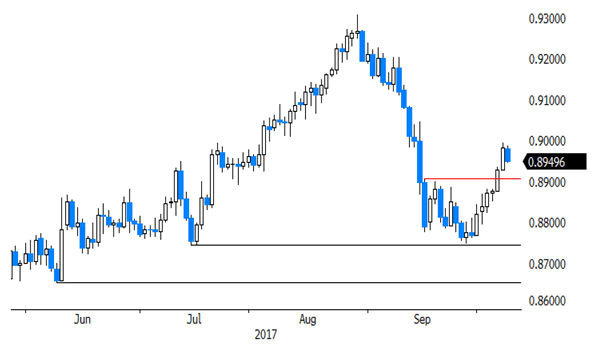Sunrise Market Commentary
- Rates: Core bonds prone for some consolidation/correction?
The absence of US investors and second tier eco calendar suggests a slow start to the trading week. A failed test of key yield resistance levels and the geopolitical context suggests that core bonds are prone for some consolidation/correction higher despite a rather heavy EMU/US supply calendar this week. - Currencies: Dollar fails to extend gains post payrolls
On Friday, the dollar temporary profited from a decline in the unemployment rate and higher wages, but the gains evaporated soon. Key technical USD resistance stayed out of reach. Today, the calendar is uneventful. USD trading will probably be order-driven. Geo-political risk remains a wildcard.
The Sunrise Headlines
- US stock markets recorded minor losses on Friday after a record-smashing week. Most Asian stock markets are positively oriented overnight with China outperforming (catch-up move after last week’s holidays) and Japan closed.
- German Chancellor Merkel’s Christian Democrats (CDU) reached a deal on migrant policy with her conservative Bavarian allies (CSU), removing a major obstacle to pursuing talks on a coalition with other parties.
- The US and Turkey each suspended visa services for citizens looking to visit the other country, a sharp escalation of a diplomatic spat that sent the lira down. EUR/TRY currently trades around 4.35, the highest level on record.
- Wolfgang Schäuble has warned that spiralling levels of global debt and liquidity present a major risk to the world economy, in his parting shot as Germany’s finance minister.
- The kiwi dollar (NZD/USD < 0.71) slumped to a four-month low after final election results showed the two main political parties are each in a position to form a viable coalition government.
- OPEC and other oil producers may need to take "some extraordinary measures" next year to rebalance the oil market, the OPEC secretary-general said. OPEC meets next on November 30 in Vienna.
- Today’s eco calendar is empty apart from German production data. US markets are closed for Columbus day. September Chinese Caixin PMI’s declined this morning (services from 52.4 to 51.4 and composite from 52.7 to 50.6).
Currencies: Dollar Fails To Extend Gains Post Payrolls
Dollar doesn’t profit from distorted US payrolls
September US payrolls were distorted by the hurricanes, resulting in a decline in September job growth. However, the lower unemployment rate (4.2%) and a rise in average hourly earnings suggested a further improvement in labour market conditions. US yields and the dollar rose temporary on Friday, but gains evaporated on rumours that North Korea was considering military action. Cautiousness prevailed ahead of the long weekend in the US. The dollar reversed the initial gains. EUR/USD closed the session at 1.1730. USD/JPY finished the week at 112.65. The dollar rally again failed to make any sustained progress.
Several Asian markets are closed this morning including Japan, Taiwan and Korea. Chinese markets show solid gains between 1% and 2% after reopening from the Golden week holidays. Political tensions remain in the headlines. Turkey and the US suspended visa services for visitors who intend to visit the other country. The incident hammered the Turkish lira, but the impact on global markets is limited. The same is true regarding ongoing tensions on North Korea. USD/JPY trades in the 112.60 area and EUR/USD around 1.1735, little changed from Friday’s close. Political uncertainty in New-Zealand persists and continues to pressure the kiwi dollar. NZD/USD trades in the 0.7075 area.
US markets are closed for Columbus day. In the EMU only the French business sentiment survey (BdF) and the Sentix investor sentiment survey are released, which are no market movers. Later this week, the EMU calendar remains unattractive. In the US the focus is on Friday when the September CPI (inflation), retail sales and October Michigan consumer confidence will be released. Inflation likely increased. We are especially looking to the core inflation, which showed signs of bottoming out in August. Retail sales are expected strong and we see few reasons why consumer sentiment should have declined from cycle highs.
This combination, if confirmed, could galvanise expectations that the Fed will increase rates in December and during 2018. Central bank speakers are again plentiful. The crucial ECB meeting is coming closer and the debate inside the ECB on the APP may gradually come to conclusions. So, it is possible that more details will be revealed (eg last week’s Minutes. Today, USD trading will probably be order driven and technical in nature. (Geo)political risk is a wildcard (North Korea, Turkey, Catalonia). Recently, the euro showed quite some resilience against this kind of event risk.
From a technical point of view, EUR/USD dropped below the 1.1823/ 1.2070 consolidation pattern. The USD rebound develops very slowly, but the pair holds below the 1.1823 previous range bottom. Higher US yields are needed to support additional USD gains. Next support in EUR/USD comes in at 1.1662, while 1.1423 marks the 38% retracement from the 2017 rally. EUR/USD is captured in a cautious sell-on-upticks pattern. The USD/JPY momentum was constructive of late, but for an important part due to yen weakness. USD sentiment recently improved though. USD/JPY regained 110.67/95 (previous resistance), a short-term positive. The 114.49 correction top is the next important resistance. The rally lost momentum last week. So a break beyond 114.49 probably is not evident.

EUR/USD no real test of the 1.1662 support after Friday’s US payrolls
EUR/GBP
Sterling sell-off to slow temporary?
Sterling remained in the defensive on Friday even as there was no high profile negative news. Lingering uncertainty on the political fate of PM May and the lasting stalemate in the Brexit negotiations continued to haunt the UK currency. Sterling especially remained under pressure against the euro. EUR/GBP closed the session at 0.8981 (from 0.8927). Cable regained slightly ground as the dollar couldn’t maintain the post-payroll uptick. The pair closed the session at 1.3066 (from 1.3119).
Sterling trades slightly higher in thin Asian trading this morning. BRC indicated that consumer spending probably declined again in September. BRC also warned on further price rises. On the UK political scene, it looks that UK PM May can stay in place at least for now. In a statement, she tried to put the ball in the camp of the EU. The declining risk of May resigning might be a temporary positive for sterling, or at least slow the recent decline. However, much more is needed for a sustained sterling comeback.
EUR/GBP staged a strong uptrend since April to set a top at 0.9307 late August. UK price data amended the dynamics and hawkish BoE comments reinforced a sterling rebound. Medium term, we maintain a EUR/GBP buy-on-dips approach as we expect the mix of euro strength and sterling softness to persist. The prospect of (limited) withdrawal of BOE stimulus triggered a good sterling countermove. However, this rebound has apparently run its course. EUR/GBP supports at 0.8743 and 0.8652 are probably difficult to break. We look to buy EUR/GBP on dips. Last week’s rebound above the 0.89 area improved the ST technical picture of EUR/GBP. EUR/GBP 0.9026 is the 50% retracement of the recent countermove.

EUR/GBP extends rally north of 0.89
